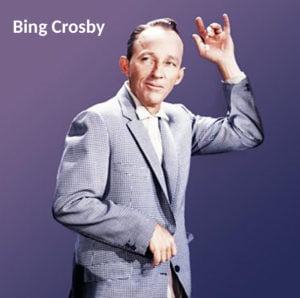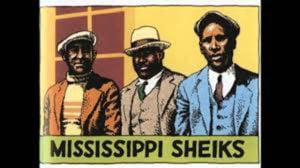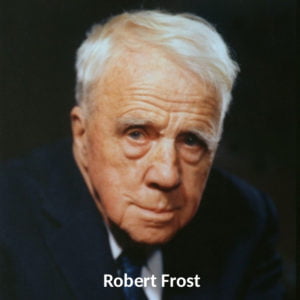…We all wear the same thorny crown…

Perhaps the most striking aspect of Modern Times is its lyrical and emotional clarity. The lyrics of 2001’s Love And Theft, like so many Dylan albums before it, featured often wildly allusive patterns of reference. But here the songs are carefully constructed to convey specific emotions and themes in a way that we may not generally think of as ‘Dylanesque’. When The Deal Goes Down is perhaps the most precisely written and the least ambiguous piece on the album. It deals with mortality and the fragility of existence ‘in this earthly domain’ with great humility and dignity. As ever with Dylan, we are presented with a number of apparently very different reference points. Its rich fusion of natural imagery and restrained ‘plain speak’ is reminiscent of the poetry of Robert Frost. It is delivered in a breathy, almost whispered Willie Nelson-style croon which befits its bittersweet nature, in a tune based on an old Bing Crosby number. There is a sparing use of archaic language, including some lines lifted from the work of Civil War poet Henry Timrod. The song is also infused with the spirit, and some of the imagery, of the blues. Yet these disparate elements are quite seamlessly combined in a transcendent, sometimes almost heartbreaking, performance. The song is a kind of open confession, in which the singer lays forth his spiritual confusion in what becomes a kind of conversation with his audience, the rest of the world and himself.

When The Deal Goes Down is especially reminiscent of two earlier Dylan songs, both of which wrestle with loss of faith, mortality and the mysteries of the cosmos. Every Grain of Sand (1981) was written at the end of his most overtly religious period, following his dramatic conversion to Born Again Christianity in 1979. But here the moral certainty of the songs of two years before is replaced by profound self-doubt. Although he declares that he can …see the Master’s hand…. in every aspect of creation, he finally confesses that …sometimes I turn, there’s someone there, other times it’s only me… as if his whole experience of God has been merely one of his own projections. By the time of Not Dark Yet (1997) the singer faces a complete loss of faith, feeling that his …soul has turned into steel…. and telling us that …sometimes my burden is more than I can bear… When The Deal Goes Down attempts to provide a resolution to this ongoing spiritual crisis. What makes the song so moving is the way it depicts a struggle for, and perhaps a final attainment of, a kind of grace, or spiritual enlightenment, achieved not through any conventionally ‘religious’ path but through making a personal ‘deal’ with the spirit of creativity. Dylan has stated that he now places his faith not in any deity but in the old songs he constantly revisits and refers to in his art, many of them (such as Hank Williams’ manic gospel number I Saw The Light) rather turbulent expressions of faith. As with Spirit On The Water and Rollin’ And Tumblin’, Dylan makes the spirit of creativity his touchstone, his ‘God’, his ‘Tambourine Man’.
The song begins like a slow country waltz, with some mournful steel guitar and tense percussive brush strokes. In the first verse Dylan describes the state of spiritual confusion he has found himself in, confessing that he is ‘bewildered’ and that …we live and we die/We know not why… Any prayers that may be offered up are like invisible clouds, floating away unnoticed. The ‘pathways of life’ are dark and the singer stands in the symbolic landscape of …the world’s ancient light/Where wisdom grows up in strife… The declaration of …But I’ll be with you when the deal goes down… is the first statement of defiant faith, apparently contradicting what has gone before. Although the song sounds nothing like the blues, it has begun in the typical manner of a blues lament – by stating the singer’s troubles. The phrase ‘when the deal goes down’ is used in a number of blues songs, including Honey Babe Let The Deal Go Down by Dylan’s particular favourites The Mississippi Sheiks and Don’t Let Your Deal Go Down, originally recorded by Charlie Poole and The North Carolina Ramblers in 1925 (and covered by Dylan on several occasions). The ‘deal’ in these songs is a gambling metaphor which the singers extend to life in general, the idea being that you have to face life with whatever ‘hand’ you are dealt. Here, despite what the singer identifies as the apparent purposelessness of life, he is determined to hold onto the ‘cards’ he has been given.

As the band sticks to the minimal backdrop, Dylan continues with his understated delivery. The song continues to shift between the personal to the universal. The first lines of the second verse ...We eat and we drink, we feel and we think/far down the street we stray… suggests, in a philosophical tone, that we are all fallible creatures who will inevitably ‘stray’ from the path of virtue. The singer is ‘haunted’ by regret for ….things I never meant or wished to say… The second half of the verse moves from plainspeak into more imagistic expression. …The midnight rain follows the train… is the song’s most ‘Dylanesque’ line, itself derived from blues imagery. ‘Rain’ is a frequent image in Dylan’s work, frequently symbolising chaotic confusion and spiritual desolation. …I’m out in the rain/And you are on dry land… Dylan cries in 1975’s You’re A Big Girl Now, expressing his exclusion and desolation. ..Everybody’s making love… he sings in Desolation Row (1965) …or else expecting rain… In A Hard Rain’s A-Gonna Fall lies and confusion threaten to flood the entire world. Here the ‘midnight rain’ stands as a metaphor for life’s troubles, following the train which symbolises the progress of a human life. The next line …we all wear the same thorny crown… delivered with a kind of light, sighing compassion, is perhaps the song’s most resonant image, suggesting that the burden of sin is carried by us all. Despite the obvious reference to Jesus, this is decidedly not a line he would have used on Slow Train Coming or Saved. Dylan’s work has always been steeped in Biblical imagery and a concern with what he once called ‘the politics of sin’ has always been one of his central themes. The delivery of the line here is so moving because of the sense of dignity he imparts to what amounts to an almost tearfully world-weary acceptance of the inevitability of the burden we must all bear. Whereas in Not Dark Yet the burden seems to be too much for him, here he is able to bear it lightly. The next line, the exquisite …soul to soul, our shadows roll… further emphasises the idea that ultimately we are all equally mortal, our ‘shadows’ merging together in the spiritual world. Dylan caresses the words, with their neat internal rhyme suggesting his acceptance of a kind of universal harmony. The tile line at the end of the verse now begins with ‘and’ rather than ‘but’. The contradictions of the first verse have clearly, to some extent, been resolved.
The third verse depicts the singer in a twilight, moonlit world – as if he is the ‘pale ghost’ from Spirit On The Water. The mood of reconciliation continues. …We learn to live… he tell us …and then we forgive/ o’er the road we’re bound to go… The anachronistic expression give the lines a kind of timeless quality, with the reference to the ‘road’ of life echoing the ‘street’ on which we ‘stray’ from the first verse. Perhaps Dylan was recalling Robert Frost’s famous poem The Road Not Taken with its final declaration that …I shall be telling this with a sigh/Somewhere ages and ages hence/Two road diverged in a wood and I/Took the one less travelled by/And that one has made all the difference… The tone of resigned acceptance of fate and the idea that the choices we make that determine our lives are not always thought through parallels Dylan’s position here. The next lines, partly ‘sampled’ from Timrod, focus again on the fragility of life: …more frailer than the flowers/these precious hours… Dylan adds the remarkable …that keep us so tightly bound… suggesting that we often keep the ‘flower’ of our lives, and of our creativity, ‘tightly bound’ like pressed flowers in an old book. The implication seems to be that life is infinitely precious and that it should not be wasted in futile struggle. Following this, the final lines are now triumphant, with the singer greeting his muse like a revelation, a …vision from the skies…

The final verse sees the spiritual seeker reaffirming his newfound acceptance of life’s turbulent path. Instead of following a ‘road ‘he follows a more natural ‘winding stream’. He tells us that picks up a rose, the Blakean symbol of love, life and death and that, rather comically … it poked through my clothes… as if he does not feel it pricking him now. He is immune to its effects. Although he lives in …this earthly domain/full of disappointment and pain… he now fully accepts his place in the scheme of things. Despite the ‘deafening noise’ of life’s mad confusion, he accepts the ‘transient joys’ of life, even though … I know they’re not what they seem… He confesses that he ‘owes his heart’ to his muse. He fully accepts the hand that life has dealt him. And he implies that when death comes – when his ‘deal’ finally ‘goes down’ he will be reunited with the spirit of creativity that he now places his faith in. Thus When The Deal Goes Down is a kind of summation of the journey through spiritual confusion symbolised in Every Grain of Sand’s heartaching line …the bitter dance of loneliness, fading into space… It rejects the dark visions of much of what follows, such as the terrifying final line of 1985’s apocalyptic Dark Eyes : …a million faces at my feet/and all I see are dark eyes… and the jaded, resigned millenialist moralism of 1989’s Ring Them Bells : …Ring Them Bells/For the chosen few/Who will judge the many/When the game is through…. Since the late ‘80s Dylan has pursued, through his Never Ending Tour, a thorough exploration of the sources of his inspiration. Caught in the grip of spiritual despair and artistic desperation he declared himself …determined to stand… whether or not he could still retain his faith. Now, with Modern Times he triumphantly reasserts his ‘conversion’ to a new kind of faith – faith in himself and humanity. When The Deal Goes Down dramatises the struggle he has been through to reach this point. Now freed from the shackles of dogmatic thinking that have plagued him for so many years, he has produced a fundamentally humanistic collection of songs which confronts mortality and the vicissitudes of life itself with heartfelt compassion and great courage.
A different version of this text appears in DETERMINED TO STAND: THE REINVENTION OF BOB DYLAN
………………………………………………………………………………………………………………………………………………………………………………………………………
DYLAN LINKS
DAILY DYLAN NEWS at the wonderful EXPECTING RAIN
THE BOB DYLAN PROJECT- COMPREHENSIVE LISTINGS
STILL ON THE ROAD – ALL DYLAN’S GIGS
THE CAMBRIDGE BOB DYLAN SOCIETY



Leave a Reply